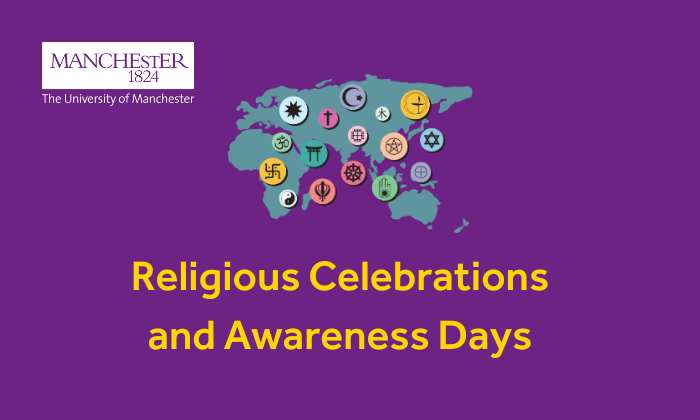Religious awareness days this March and April
03 Mar 2025
Observing religious celebrations this March and April

We recognise that many members of our University community will be observing a variety of religious traditions and celebrations in the coming weeks. They include:
March
Tuesday, 4 March – Shrove Tuesday (Christianity): Shrove Tuesday is the final pre-Lent day that centres around self-reflection. It is marked by attending confession, deciding on a Lenten sacrifice and sharing pancakes in many denominations of Christianity.
Wednesday, 5 March – Ash Wednesday (Christianity): This day marks the beginning of Lent and commemorates the 40 days that Christ spent fasting and praying. Many Christians nominate a personal sacrifice to go without for the duration of Lent.
Thursday, 13 March – Fast of Esther (Judaism): This fast takes place on the day before Purim, starting at dawn and ending at nightfall. The day encourages prayer and introspection as special prayers are added to synagogue services.
Thursday, 13 to Friday, 14 March – Purim (Judaism): Purim is a joyous celebration marked by exchanging gifts with family and friends, wearing fancy dress and sharing feasts.
Friday, 14 to Sunday, 16 March – Hola Mohalla (Sikhism): This three-day festival showcases the martial spirit and rich heritage of Sikhism through simulated battles, music and poetry.
Friday, 14 March - Holi (Hinduism): Holi, known as the festival of colours, marks the arrival of spring, love, and new life. Some link it to Hiranyakashipu's legend, while others celebrate Krishna and Radha. Traditions vary, but many enjoy dancing, singing, and throwing coloured powder and water.
Tuesday, 18 March - Birthday of Guan Yin/ Bodhisattva Avalokitesvara (Buddhism): Guan Yin is a Chinese Buddhist goddess of mercy who vowed to alleviate suffering and respond to prayers. Buddhist temples hold special services for practitioners to connect with Guan Yin’s teachings.
Wednesday, 19 March – Ostara/Spring Equinox (Spiritualist): This Spiritualist holiday finds its roots in Pagan tradition and focuses on rebirth. Observers celebrate by planting new wildlife, enjoying crafts and meditating on balance.
Sunday, 30 March – Eid al-Fitr/End of Ramadan (Islam): This day marks the end of Ramadan which concludes an intense month of fasting, prayer and self-reflection for individuals and their communities. Friends and family gather to celebrate with food and drink and exchange gifts.
April
Saturday, 12 to Sunday, 20 April – Passover (Judaism): Passover is a celebration of the story of Exodus where ancestors left slavery behind them and led out of Egypt by Moses. Celebrations include sharing a meal with family and friends whilst revisiting the story of Exodus.
Sunday, 13 April – Palm Sunday (Christianity): This holiday marks the start of Holy Week and Jesus' arrival in Jerusalem, which involves making small crosses from palm leaves and attending church services.
Sunday, 13 April – Theravada New Year (Buddhism): Theravada New Year marks the start of the new with a focus on washing with water that symbolises purity and a fresh start after the previous year.
Monday, 14 April – Vaisakhi (Sikhism): Vaisakhi is the festival which celebrates the founding of the Sikh community, the Khalsa, in 1699. Celebrations involve attending services followed by singing and chanting in colourful clothing.
Thursday, 17 April – End of Lent (Christianity): Maundy Thursday marks the end of Lent when Jesus shared the Last Supper with his disciples. Traditions include a simple meal of bread and wine and the washing of feet in some practices.
Friday, 18 April – Good Friday (Christianity): This day marks the crucifixion of Jesus, during which some denominations of Christianity abstain from eating meat and reflect on this solemn day.
Saturday, 19 April – Holy Saturday (Christianity): Holy Saturday commemorates the day that Jesus’ body was lowered into his tomb with Easter services in some denominations of Christianity.
Sunday, 20 April – Easter Sunday (Christianity): This day commemorates the resurrection of Jesus, marked with church services and Easter festivities including egg hunts, Easter bonnets and decorations to focus on new life.
Monday, 21 April – Easter Monday (Christianity): As a public holiday in some countries, Easter Monday further celebrates Jesus’ resurrection with some areas of Christianity observing outdoor processions.
Wednesday, 23 April – St George’s Day (Christianity): St George’s Day is recognised as England's national day to mark the death of the Patron Saint of England. Observers typically take part in parades, parties and church services to mark the day.
Following our EDI Diversity Calendar, we focus on the six major world faiths currently represented within our community – Buddhism, Christianity, Hinduism, Islam, Judaism, and Sikhism. This does not mean we do not recognise that there are many more faiths equally as important.
We also recognise that a large proportion of our community may have no religion or belief or observe other secular events.
More information
We aim to take an integrated approach that celebrates individuals and their many identities to ensure that we are truly inclusive of all our community. This is set out in our Equality, Diversity and Inclusion strategy. Equality, Diversity and Inclusion: Religion or belief (including no belief).
- Multi-faith chaplaincy;
- Our Staff Networks are a great way to connect with the wider University community. To find out more email the EDI Team at equalityanddiversity@manchester.ac.uk;
- Visit our EDI blog - a place where colleagues can share their thoughts and insights related to equality, diversity and inclusion.
